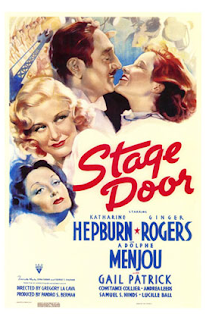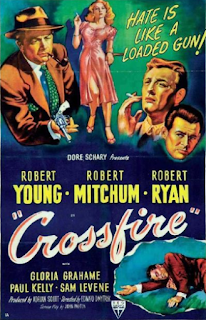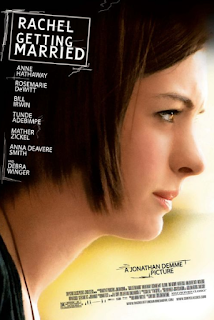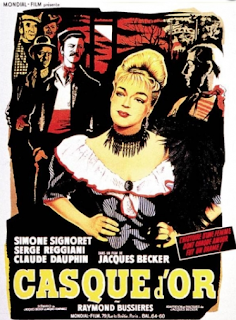Stage Door (1937)
To most people, Gregory La Cava is known as the director of classic screwball comedy My Man Godfrey (1936), the enchanting, lively tale of a homeless man who becomes the butler of a wealthy family. The rest of his filmography is for the most part rather forgotten: films like The Affairs of Cellini (1934), Private Worlds (1935) and Primrose Path (1940) are mostly remembered because of their Oscar-nominated performances, if they are at all, and among the few people that have actually seen them they are not held in particularly high esteem. Stage Door, loosely based on the play of the same name, is a peculiar case, as it is neither as iconic and revered as My Man Godfrey nor as obscure as the other movies - and it turns out it's a surprisingly strong piece. Centering around a group of aspiring actresses in New York, Stage Door is not a movie that wants to be revolutionary in its thecnique, nor a social commentary, nor a thoughtful reflection on the theatrical world. It's just a film that wants to entertain and tell a good story - and it does it exceptionally well.
Thanks to the subdued but effective job from editor William Hamilton, the movie goes on smoothly and works as a beautifully constructed piece - the various parallel storylines are given each the right amount of time without any of them prevailing on the other and without ever distracting from the common thread that ties all of the characters together. The result is an incredibly organic and cohesive film, in which every piece of the puzzle is perfectly fitting and one that is fast-paced without ever being rushed. La Cava might be a perfectly consistent director but his work here, which earned him a well-deserved New York Film Critics Circle Award, is confident and assured: he does an especially good job at directing his actresses creating a genuine sense of camaraderie, friendship and even sisterly affection between them. The setting is, for the most part, limited to the rooming house in which the girls live, but LaCava's direction grants the film such a strong, vivid sense of place that it never feels stagey. And he has a surprisingly strong grasp on the movie's wavering tone: he already showed he had a skill for comedy in My Man Godfrey but what's especially great is how he manages to integrate the more dramatic, even tragic, elements into the story in a way that feels genuine and not jarring.
Apparently, writers Morrie Ryskind and Anthony Veiller listened to the actresses talking and joking in between takes and incorporated their style of talking into the script: the result is a blazingly funny, witty screenplay, and its brilliant wisecracks couldn't have found a better match in a cast that features performers so skilled in comedies such as Katharine Hepburn, Ginger Rogers, Lucille Ball and Eve Arden. As a matter of fact, there isn't a single false note in the casting department and every actor does fine work with what he is given. Adolph Menjou leaves a remarkable impression as the charismatic but callous producer, who thinks of profits first and foremost, with little to no consideration to talent and heart. Constance Collier is amusing as a faded, delusional actress who appoints herself as a mentor of sorts, while Gail Patrick proves once again after My Man Godfrey her talent for catty, biting remarks. The rest of the cast is uniformly strong but there are three performers who leave the strongest impression: Hepburn, Rogers and Oscar-nominated Andrea Leeds. As Terry, a wealthy girl who decides to pursue an acting career in spite of her father's objections, Hepburn delivers a memorable performance, putting her incandescent screen-presence to good use, and brings surprising complexity to the part, aptly portraying her character's unaware arrogance but also her genuinely good, kind heart. She portrays her character's arc and she's the one who brings the needed pathos to the final act. Even more impressive is Rogers, who gives the strongest performance in the movie and perhaps the best performance of her career: throughout her career, Rogers proved both her dramatic and comedic chops and here she gets to show off. She's a hurricane on-screen, stealing the scene whenever she pops up and nailing the script's hilarious one-liners like no other: but she also brings substance to the part, touchingly showing the embittered, disillusioned young woman behind her abrasive, sassy behavior. Leeds does not get a whole lot of screen-time, but she is given the role with most dramatic weight and nails it: portraying a formerly successful but quickly forgotten young acress trying to find work, she delivers an aching, heartfelt turn excellently conveying her character's transition from hopefulness to desperation. The scene on the stairs, shot in magnificent chiaroscuro that highlights the conflicted emotions crossing Leeds' face, is especially powerful.
Ultimately, Stage Door isn't a movie that has something especially original to say. But it's a beautifully written and directed movie filled with talented performers and remarkable performances. It amounts to a compelling and fun viewing experience and one that genuinely moves you in its more serious moments. It's a lovely movie you won't regret watching.
80/100




This one I'm looking foward to watch, since the more I see from Rogers the more I like her (except for her dreadful turn in Roxie Hart). Glad you liked her here.
RispondiEliminaI haven't seen Roxie Hart, nor do I really want to. I suggest you to see this, it's an enjoyable film and Rogers is splendid. It's a very entertaining, charming performance and a nicely grounded character.
EliminaHaven't seen this. Come to think of it, I don't think I've ever seen a Hepburn film actually.
RispondiEliminaHepburn is a magnificent actress. I have a lot of her supposedly best work left to see, but I think she always leaves a very nice impression. She is particarly phenomenal in Long Day's Journey Into Night.
Elimina